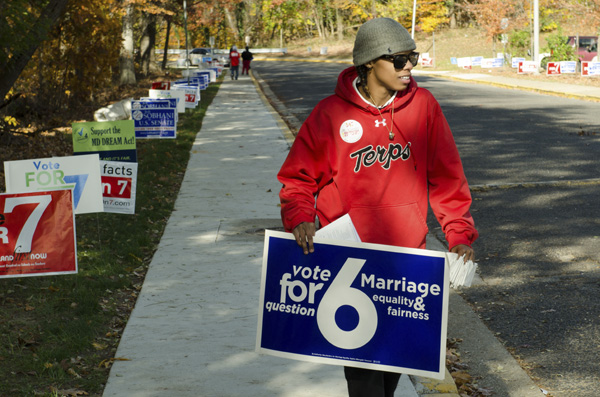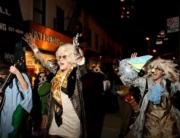The New Black film poses the question, are lesbian, gay, bisexual, and transgender (LGBT) issues the new black? Is the struggle for marriage equality the forefront of civil rights in America today?
The documentary explores the African-American communities’ response, primarily through following conversations in Maryland, where nearly a third of the electorate is black, during the 2012 election when Proposition 6, “the marriage question,” is on the ballot.
Director Yoruba Richen spent more than three years—from 2008 to 2013—following the dialogue and debate, the perfect time in history to capture the evolving conversation. She does a great job in creating a balance of voices and opinions on both sides.
She conceived the idea the night of the 2008 historic election of President Barack Obama. On the same day the first African-American president was elected, Proposition 8 overturned the California courts ruling granting the right of same-sex couples to marry. Its passage was reportedly due to a 70 percent support from African-Americans voters. While this was later proved false, the narrative that came out of this polarized African Americans and gays, at least in the media, as if these two groups did not intersect.
As Audre Lorde says, “Within the lesbian community I am Black, and within the Black community I am a lesbian. Any attack against Black people is a lesbian and gay issue, because I and thousands of other Black women are part of the lesbian community. Any attack against lesbians and gays is a Black issue, because thousands of lesbians and gay men are Black. There is no hierarchy of oppression.” (Bulletin on Homophobia and Education, 1983).
The New Black interviews pastors, church members, people on the streets, poll workers, and family members of LGBT. The result is a fascinating dialogue. Sharon Lettman-Hicks, the executive director and chief executive officer of the National Black Justice Coalition, an organization dedicated to empowering black LGBT people, says strongly and with great charisma, “This is the unfinished business of black people being free.” She happens to be both heterosexual and African American, and couldn’t be a more impassioned spokesperson.
Fred Shuttlesworth, who marched with Martin Luther King, Jr, says, however, “This is not a civil rights issue.” Adding another perspective, an ex-fundamentalist preacher says the Montgomery Bus Boycott was also not a priority issue for everyone—it was a means to an end. President Obama is on film, saying he is a Christian and that marriage is between a man and a woman, but in a later clip, he says everyone should have the right to marry who they love. The varied voices are compelling and informative, probably more so at a Lettman-Hicks family gathering, where opinions and discussions on the matter run the gamut.
An excellent entry point for people not familiar with the perceptions involved, it can also be used as an educational and teaching tool for social studies in high schools and colleges. It certainly is an important documentation of a transformative time. In 2009, Tonéx, an African-American gospel singer, came out of the closet publicly on The Lexi Show, a popular Christian YouTube program. Indeed, the times they are a-changin’, and this film documents it all phenomenally.







Leave A Comment